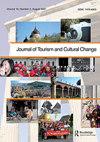Tourist ethnocentrism and tourism intentions during a political crisis
IF 2.5
4区 管理学
Q2 HOSPITALITY, LEISURE, SPORT & TOURISM
引用次数: 5
Abstract
ABSTRACT In the context of a worldwide resurgence of ethnocentrism, understanding the effect of tourist ethnocentrism on tourism intentions is important for the sustainable development of tourism. This study of tourism intentions is centred on the recent social unrest in Hong Kong, which has aroused the ethnocentrism of mainland Chinese tourists. A conceptual model is constructed, comprising positive and negative tourist ethnocentrism, tourists’ perceptions of safety and security, and tourism intentions. The opinions of a sample of 558 Chinese mainland college students are collected to test the hypotheses. The findings indicate that positive tourist ethnocentrism increased tourism intention to travel to Hong Kong when the mainland Chinese participants regarded Hong Kong as a Chinese ethnic in-group, whereas negative tourist ethnocentrism reduced tourism intention to travel to Hong Kong when the mainland Chinese participants regarded Hong Kong as a Chinese ethnic out-group. Perceptions of safety and security were important mediators in the relationships between tourist ethnocentrism and tourism intentions. Therefore, tourism managers must consider potential tourists’ ethnocentrism and how a destination is positioned in tourists’ minds to reasonably satisfy their needs and thus promote the long-term development of the destination.政治危机中的旅游民族中心主义与旅游意向
摘要在民族中心主义在世界范围内死灰复燃的背景下,了解旅游民族中心主义对旅游意向的影响对旅游业的可持续发展具有重要意义。本研究以香港最近的社会动荡为中心,对中国大陆游客的民族中心主义进行研究。构建了一个概念模型,包括积极和消极的游客种族中心主义、游客的安全感和旅游意向。本研究以558名大陆大学生为样本,对这些假设进行了检验。研究结果表明,当中国大陆参与者将香港视为中国少数民族群体时,积极的旅游民族中心主义增加了赴香港旅游的意愿;而当中国大陆与会者将香港视为中国少民群体时,消极的旅游种族中心主义减少了赴香港旅游的意愿。安全感和保障感是游客种族中心主义与旅游意向之间关系的重要中介。因此,旅游管理者必须考虑潜在游客的种族中心主义,以及目的地在游客心目中的定位,以合理地满足他们的需求,从而促进目的地的长期发展。
本文章由计算机程序翻译,如有差异,请以英文原文为准。
求助全文
约1分钟内获得全文
求助全文
来源期刊

Journal of Tourism and Cultural Change
HOSPITALITY, LEISURE, SPORT & TOURISM-
CiteScore
5.10
自引率
9.10%
发文量
31
期刊介绍:
Journal of Tourism and Cultural Change ( JTCC ) is a peer-reviewed, transdisciplinary and transnational journal. It focuses on critically examining the relationships, tensions, representations, conflicts and possibilities that exist between tourism/travel and culture/cultures in an increasingly complex global context. JTCC provides a forum for debate against the backdrop of local, regional, national and transnational understandings of identity and difference. Economic restructuring, recognitions of the cultural dimension of biodiversity and sustainable development, contests regarding the positive and negative impact of patterns of tourist behaviour on cultural diversity, and transcultural strivings - all provide an important focus for JTCC . Global capitalism, in its myriad forms engages with multiple ''ways of being'', generating new relationships, re-evaluating existing, and challenging ways of knowing and being. Tourists and the tourism industry continue to find inventive ways to commodify, transform, present/re-present and consume material culture. JTCC seeks to widen and deepen understandings of such changing relationships and stimulate critical debate by: -Adopting a multidisciplinary approach -Encouraging deep and critical approaches to policy and practice -Embracing an inclusive definition of culture -Focusing on the concept, processes and meanings of change -Encouraging trans-national/transcultural perspectives
 求助内容:
求助内容: 应助结果提醒方式:
应助结果提醒方式:


